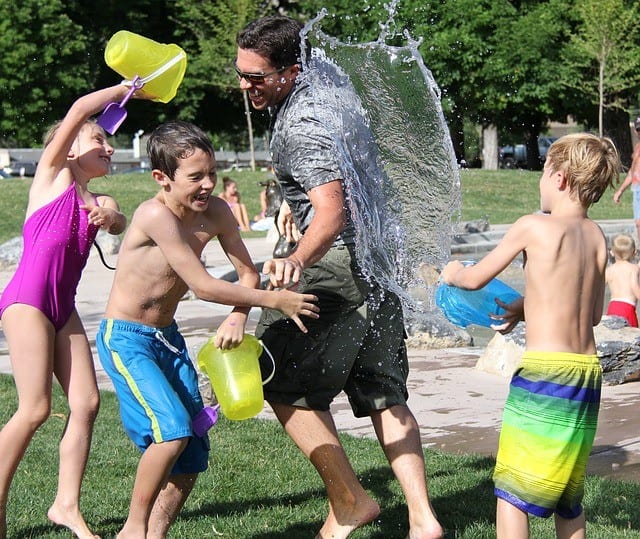F or 180 days each year, most kids are in school, brains engaged and learning. Then along comes the summer and for many, learning comes to a screeching halt.
It’s not like there’s absolutely no brain activity happening over the summer, but by the time they go back to school, many students forget some of the skills they learned. The Washington Post reports that in a recent survey, 66% of teachers say they spend most of the first month of school teaching concepts that students have forgotten over the break.
Call it “summer brain drain” or “summer slide,” educators say it’s a real phenomenon and that math skills seem to be the quickest to disappear. But reading skills suffer, too. And even the youngest students experience the slide. Diane Robusto is a Pre-K teacher in Virginia Beach, Virginia. “I spend all of September reviewing the alphabet,” she says.
As a parent, you want your kids to be kids and enjoy their summer. Few parents would advocate noses-in-books throughout summer recess. But in keeping with the idea that learning should be fun and interesting, summer also presents a great opportunity for kids to practice skills and explore things that they enjoy. And experts say that you don’t have to teach your kids anything new, just reinforce the skills they already have.
In other words, it’s possible for parents to “sneak in” a little learning even when there’s no classroom, and the curriculum connections are stronger than you may think.
It’s easy to merge a little summer fun with math. Since those skills seem to disappear first, here are some ideas to consider:
*Cook up a recipe with your kids, but make only half of the quantity. Challenge kids to do the math to make sure the recipe turns out right.
*Teach young kids how to play card games, like “War,” to reinforce the concepts of “greater than,” “less than” and “equal.”
*Use dice or dominoes to play number games. Have your child roll the dice, then add up the numbers they display. Take one cube away. How many spots are left?
*Have older kids plan your next car trip, from calculating distances and driving times to planning stops for food and gas, budgeting costs and even determining whether it’s cheaper to drive or fly.
Beyond math, there are other subjects that can be easily incorporated into summer fun: Use the Internet to help kids identify insects and plants they find in the yard. Invest in an inexpensive telescope. Point out the planets, constellations and phases of the moon in the summer sky. Go online to find out what makes a firefly light up.
Noha Mols is a special education teacher and lead tutor strategist at Ashley Tutors. She tells edCircuit, “I believe summer is a time to learn, practice and apply some skills students learn throughout the school year. However, it should look differently; it should be fun and creative.”
Robusto agrees that it’s important to keep kids’ brains stimulated in fun ways. She advises parents to continue to read with them, and encourage their kids to read words they see on street signs and other places.
The vacation season is the perfect time to take in a trip to a local (or distant) museum or historical site. On the way there, or even on the way to the grocery store, there are easy ways to keep kids engaged in words. Robusto says to encourage kids to read the words they see on street signs, or challenge them to “find a word that begins with the letter ‘A’,” and so on. She says making a game of it makes it even more fun.
And you don’t have to travel far or spend a lot of money to reinforce basic skills. “Take your children to a dollar store and let them pick out short workbooks,” advises Robusto. “Kids are more engaged when they’ve chosen the books themselves, and they feel a sense of accomplishment when the book is finished,” she says. “Kids love to get to the end of a book.”
Websites including the NEA, Washington Post, Mother Nature Network and Family Education offer additional ideas from educators and parents for stopping summer brain drain. Some websites, like Otterbox.com, highlight apps that can keep the learning going all summer long.
There are also new approaches to summer camp that mix social skills with brain power. The modern camp is not necessarily all about swimming and rowing. Mols says that thematic camps are very popular in British Columbia, where she teaches. Their themes range from nature to STEM to culinary arts to history and beyond. There’s a camp for almost every interest.
“Summer camps are a perfect option to let students be kids,” Mols says. “Let them play, make friends and try something new, make mistakes and learn from them.”
And don’t underestimate the benefits of unstructured play. The cognitive benefits of play are well-documented in scientific studies. Play can improve memory, attention span, language and problem-solving. Let kids exercise their imaginations while they do what they want to do.
Finally, remember that interacting with you is what your child values most. “Kids love to play games, but really love it when their parents are involved,” says Robusto. Learning should always be fun, but learning with Mom or Dad is an experience kids remember for a lifetime.
That’s a memory that can’t be drained away.
